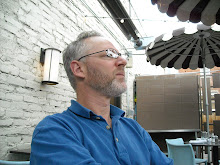As someone who believes patronizing local businesses is the most virtuous form of economic development, it grieved me to find a note taped to the door of Urban Harvest, formerly the locally owned coffee shop at the Lowry Town Center in Denver, saying they'd closed due to rising food costs and general economic suckiness (my word). An Einstein's Bagels is taking its place.
My grief was moderated by the realization that I would now have decent bagels and coffee within walking distance. Try as I did to love Urban Harvest, I found their baked goods uninspired, their coffee expensive, and the atmosphere dull. Thus I forced myself to confront the reality that no business is worth supporting merely because it's small. Anyone who wants my money had better actually be good. And sometimes -- often, it must be admitted -- quality depends upon efficiency, which in turn depends upon size.
I have for about 8 years benefited from this truth when it comes to health care, and I think (hope, anyway) the nation as a whole is starting to clamor for efficiency. Coming from a family of doctors in independent practice, my wife had a visceral if vestigial hatred of Kaiser Permanente, and refused to allow me to sign up with Kaiser when it was presented to me as one of several choices by my first employer in Denver, 10 years ago. Instead we went with a more expensive plan that allowed us to choose our own doctors -- but also allowed those doctors to prescribe any drug on earth with no regard to whether it was on the formulary, sometimes forcing us to make two midnight trips to the pharmacy to treat an ailing child. What was covered and what wasn't, was pure guesswork.
After enough of these disappointments we finally did sign on with Kaiser, and have liked it so much that for a time we actually paid more to keep it (indirectly, through a series of flex-plan choices that summed out to having fewer dollars for other benefits; Kaiser itself was always the cheapest option). To translate the decision to coffee shop terms: we chose Einstein's over Urban Harvest.
"Kaiser horror stories" are legion, and they effectively scared us away from the plan for a time. They almost always involve somebody who died (or worse!) because Kaiser denied them some experimental treatment. That the person probably would have died (or worse!) anyway never, of course, figures into these cautionary tales. Plans built on the independent contractor model pay doctors more for doing more procedures, while a genuine health maintenance organization -- the way the HMO was originally conceived of in the 1970s -- conserves resources by sharing information and overtly discouraging over-use. How odd that the communal model is, at heart, the more conservative.
It seems that the health care debate is shifting from private-versus-public to integrated-versus... well, disintegrated. Kaiser is a private plan, yet it functions much the same way as the public plan I used when I lived in famously healthy Japan. I can't let nostalgia for small businesses stop me from recognizing the savings generated when I can take care of an exam, a lab test and a prescription (heck, even new glasses if I plan ahead) on a single visit, in a single building, with my electronic chart preceding me to each stop.
For years the guy at our local pharmacy called my mother "Mrs. H." and for years she resented it. How fortunate it now seems to have been able to buy baby aspirin from a merchant who bothered to learn and remember a customer's name, even if only one-sixth of it. Perhaps nobody at Kaiser will ever honor me with over-familiarity by calling me "Mr. H," and for this loss, like the loss of Urban Harvest, we may suffer a pang of regret. But Kaiser's efficiency is keeping me healthy, and the entire country deserves to know the same sense of security.

You are hereby appointed the Health Czar.
ReplyDelete